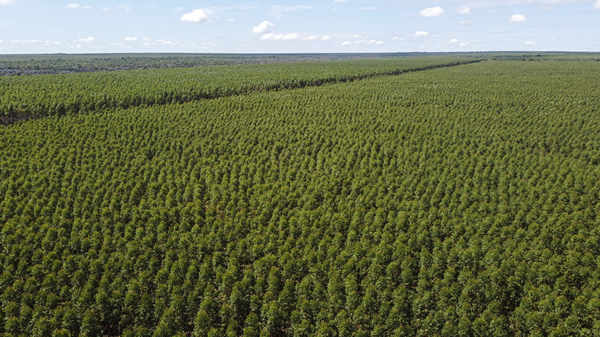Suzano’s breeding program is responsible for developing and making the recommendation of clones for operational eucalyptus farms. We explore the natural genetic diversity of the genus Eucalyptus, which is composed of more than 700 species, that allow us generating new eucalyptus hybrids by crossings between different species. We explore this genetic variability to select clones that are: more adapted to different environments, more productive and more resilient to both biotic (pest and diseases) and abiotic (drought, heat, frost, flooding, etc.) stresses.
Our breeding program is more than 60 years old. During this time, we have been using the most modern breeding strategies, and more recently, we are widely using molecular marker technology to assure the quality of our processes through genetic certification, to better understand the genetic variability of our eucalyptus germplasm, and to improve the accuracy and precision of the selection of clones more productively, through the use of genomic approaches like genome wide selection. Furthermore, we are developing imaging tools to better and more precisely phenotype different traits, for instance, to measure the height of the trees.
Another great innovation in breeding is the development of a system called Tetrys, which is being used by breeders to aid the allocation of clones in Suzano´s multiple operational environments. This system maximizes the forest productivity (MAIcel) by exploring the best clone by environment interaction, while taking into consideration the risk associated with diseases and climatic variation.
Aiming at the mitigation of climate change impacts in eucalyptus farms, we have several project initiatives in our portfolio. One of these initiatives is the introduction and testing of Corymbia, which is a genus evolutionarily related to Eucalyptus, and is known to be more tolerant to some (a)biotic stresses. A second initiative, a project called DryMax, seeks to cross our core elite breeding population with Eucalyptus species more tolerant to drought, in order to develop more resilient eucalyptus clones, and to better understand the mechanisms involved in drought tolerance.
It is superlative to emphasize the great synergy between Breeding and FuturaGene teams. Breeding generates and provides the best parents and clones to be used by FuturaGene in plant transformation to insert traits of interest (e.g. herbicide tolerance, etc.). Once these traits are transferred to our elite germplasm, breeding can perform new crosses to quickly introgress the traits into our breeding population and generate new clones carrying such differential trait.







